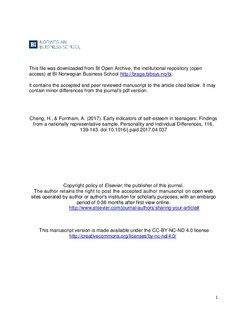Early indicators of self-esteem in teenagers: Findings from a nationally representative sample
Journal article, Peer reviewed
Accepted version
Permanent lenke
http://hdl.handle.net/11250/2465581Utgivelsesdato
2017Metadata
Vis full innførselSamlinger
- Publikasjoner fra CRIStin - BI [1015]
- Scientific articles [2173]
Originalversjon
Personality and Individual Differences. 2017, 116 (Oct.), 139-143. 10.1016/j.paid.2017.04.037Sammendrag
This study explored a longitudinal data set of 3096 British sixteen year olds with data collected in 1970, 1980, and 1986. It examined how parental social status at birth; intelligence, locus of control and behavioural problems (all measured at age 10) influenced teenage self-esteem measured at age 16. There were two related measures of self-esteem: General and School setting. Correlational analysis showed locus of control beliefs, childhood intelligence scores, behavioural problems and parental social status were all significantly related to the self-esteem measures at age 16. Structural Equation Modelling showed that childhood locus of control, childhood intelligence and behavioural problems were significant and independent predictors of self-esteem at age 16. These factors remained the significant predictors of the outcome variable after controlling for self-esteem measured at age 10, indicating the unique effects of early factors on the outcome variable. Limitations and implications of this study are considered.
